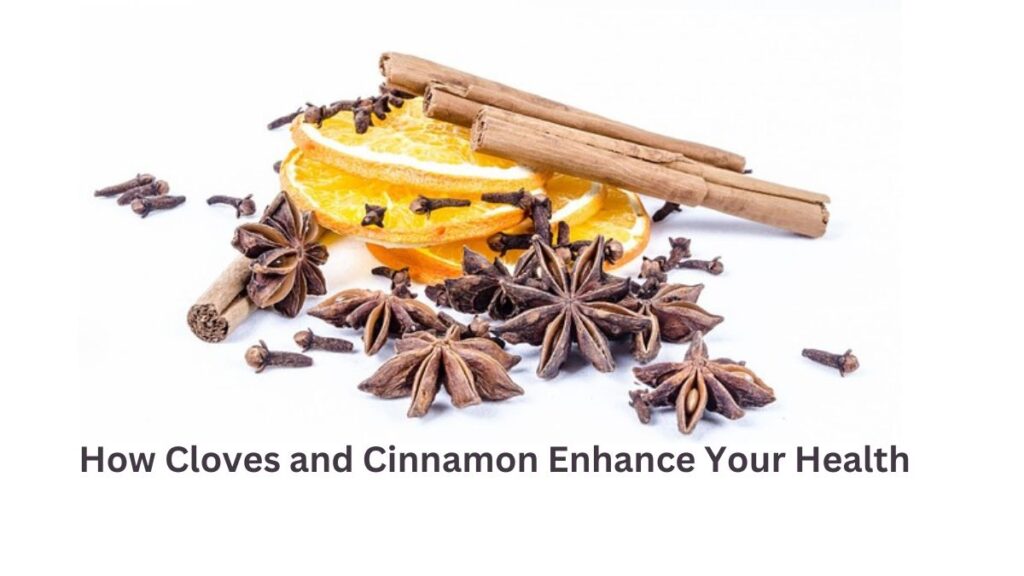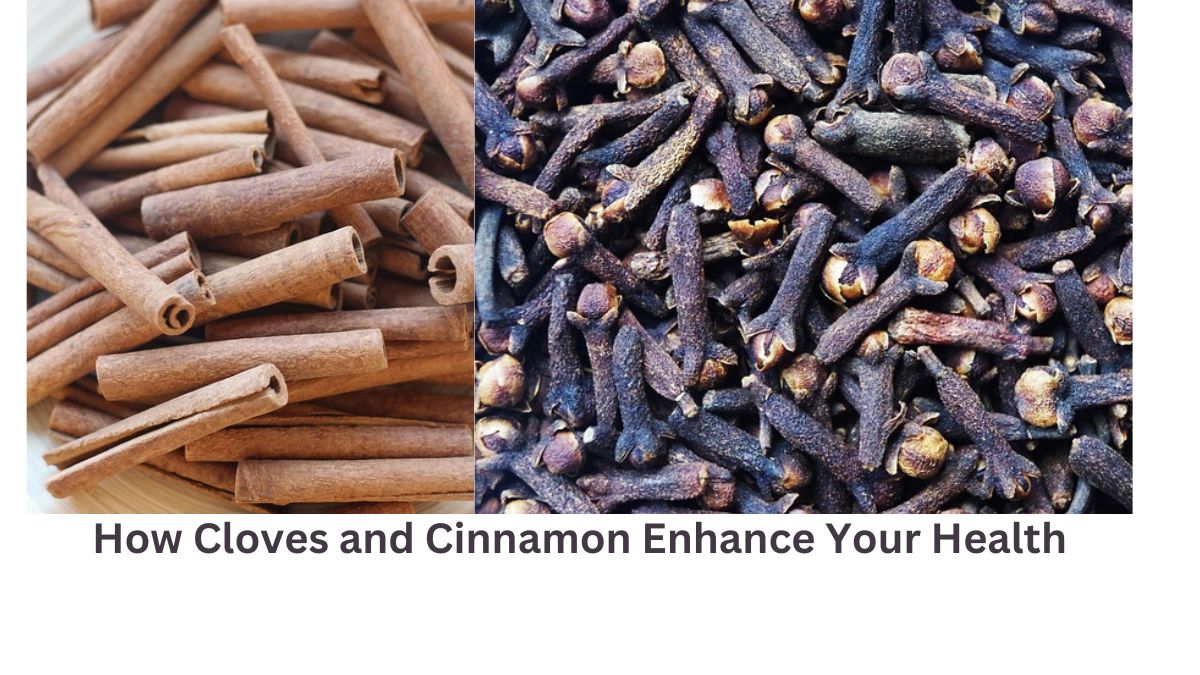Introduction:-
A Closer Look: How Cloves and Cinnamon Enhance Your Health

In the world of natural remedies, few ingredients hold as much promise as cloves and cinnamon. Beyond their aromatic appeal in cooking, these spices boast a plethora of health benefits that have been cherished for centuries. Let’s take a closer look at how cloves and cinnamon can enhance your well-being.
How cloves and cinnamon can enhance your well-being?
Cloves: Nature’s Healing Gems
Cloves, derived from the flower buds of the clove tree, are rich in antioxidants and essential nutrients. Their active compound, eugenol, exhibits powerful anti-inflammatory and analgesic properties, making cloves a go-to remedy for various ailments.

1. Oral Health Boost
Traditionally used for toothaches and oral discomfort, cloves possess natural antibacterial properties that help combat oral pathogens. Clove oil or simply chewing on a clove can alleviate toothache and promote oral hygiene.
2. Digestive Aid
Cloves stimulate enzyme secretion, aiding digestion and relieving gastrointestinal distress. They can alleviate bloating, gas, and indigestion, promoting overall digestive wellness.
3. Immune Support
Packed with antioxidants, cloves bolster the immune system, helping the body combat infections and diseases. Incorporating cloves into your diet can provide added protection against common illnesses.
Cinnamon: Spice Up Your Health
Cinnamon, prized for its distinct flavor and aroma, offers an array of health benefits beyond its culinary appeal. Its active ingredient, cinnamaldehyde, contributes to its therapeutic properties.
1. Blood Sugar Regulation
Studies suggest that cinnamon may improve insulin sensitivity, aiding in the regulation of blood sugar levels. For individuals with diabetes or insulin resistance, cinnamon can be a valuable addition to their diet.
2. Heart Health Support
Cinnamon is believed to lower levels of bad cholesterol (LDL) while raising good cholesterol (HDL), promoting heart health and reducing the risk of cardiovascular diseases.
3. Anti-Inflammatory Effects
Chronic inflammation is linked to various health issues, including arthritis and heart disease. Cinnamon’s potent anti-inflammatory properties may help mitigate inflammation and its associated risks.
Harnessing the Benefits: Incorporating Cloves and Cinnamon Into Your Routine
Now that we understand the remarkable health benefits of cloves and cinnamon, incorporating them into your daily routine is key to reaping their rewards. Here are some simple ways to do so:
- Add cloves and cinnamon to your morning smoothie or oatmeal for a flavorful and nutritious boost.
- Brew a cup of cinnamon tea by steeping cinnamon sticks in hot water for a soothing beverage that promotes wellness.
- Sprinkle ground cinnamon onto fruits, yogurt, or baked goods for a delicious and healthful twist.
- Use cloves and cinnamon in savory dishes such as curries, stews, and marinades to enhance flavor while reaping their health benefits.
Are there any studies or research indicating the potential role of cloves and cinnamon in managing digestive issues such as bloating and indigestion?
There is research indicating the potential role of cloves and cinnamon in managing digestive issues such as bloating and indigestion. Several studies have explored the digestive benefits of these spices:

- Cloves: Cloves have been traditionally used to aid digestion and alleviate gastrointestinal discomfort. Research suggests that the active compound eugenol in cloves possesses carminative properties, which can help reduce gas and bloating. Additionally, cloves may stimulate digestive enzyme secretion, promoting more efficient digestion.
- Cinnamon: Cinnamon has also been studied for its digestive benefits. Its active component, cinnamaldehyde, may help to improve digestion by increasing gastric motility and secretion of digestive enzymes. Cinnamon has been used historically to relieve gastrointestinal distress, including bloating and indigestion.
While more research is needed to fully understand the mechanisms behind cloves and cinnamon’s effects on digestion, the existing evidence suggests that incorporating these spices into your diet may help alleviate symptoms of bloating and indigestion for some individuals.
It’s important to note that individual responses to spices may vary, and it’s always advisable to consult with a healthcare professional if you have persistent digestive issues or concerns. Additionally, moderation is key, as excessive consumption of spices may exacerbate symptoms in some individuals.
How do the anti-inflammatory properties of cloves and cinnamon make them potentially beneficial for individuals with conditions such as arthritis or inflammatory bowel disease?
The anti-inflammatory properties of cloves and cinnamon hold promise for individuals with conditions like arthritis or inflammatory bowel disease (IBD) due to their ability to mitigate inflammation and alleviate associated symptoms.
- Arthritis: Cloves and cinnamon contain compounds with potent anti-inflammatory properties, such as eugenol in cloves and cinnamaldehyde in cinnamon. These compounds can help reduce inflammation in the joints, providing relief from pain, stiffness, and swelling associated with arthritis. Studies have shown that incorporating cloves and cinnamon into the diet or using them topically as essential oils may help alleviate arthritis symptoms and improve joint function.
- Inflammatory Bowel Disease (IBD): Inflammatory bowel diseases like Crohn’s disease and ulcerative colitis involve chronic inflammation of the digestive tract, leading to symptoms such as abdominal pain, diarrhea, and rectal bleeding. The anti-inflammatory effects of cloves and cinnamon may help mitigate inflammation in the gut, providing relief from IBD symptoms. Research suggests that the compounds found in cloves and cinnamon may help modulate the immune response and reduce inflammation in the digestive tract, potentially offering therapeutic benefits for individuals with IBD.
By incorporating cloves and cinnamon into their diet or using them as supplements, individuals with arthritis or inflammatory bowel disease may experience relief from inflammation-related symptoms. However, it’s essential to consult with a healthcare professional before making significant dietary changes or using supplements, especially if you have a pre-existing medical condition or are taking medications. Additionally, while cloves and cinnamon may offer potential benefits, they should not replace conventional medical treatments for these conditions.
Are there any known contraindications or potential side effects associated with the consumption of cloves and cinnamon?
While cloves and cinnamon are generally safe when consumed in moderate amounts as part of a balanced diet, there are potential contraindications and side effects to be aware of:
- Allergic Reactions: Some individuals may be allergic to cloves or cinnamon, experiencing symptoms such as itching, hives, swelling, or difficulty breathing. If you have a known allergy to related substances, such as plants in the same botanical family, use caution when consuming cloves or cinnamon.
- Blood Sugar Regulation: Cinnamon may lower blood sugar levels, which can be beneficial for individuals with diabetes but may pose risks for those already taking medications to lower blood sugar. If you have diabetes or are taking medications that affect blood sugar levels, consult with a healthcare professional before incorporating large amounts of cinnamon into your diet.
- Blood Thinning: Cloves contain eugenol, which may have blood-thinning properties. While this can be advantageous in some cases, individuals taking blood-thinning medications such as warfarin (Coumadin) should use caution when consuming large amounts of cloves, as it may increase the risk of bleeding.
- Gastrointestinal Upset: Consuming large quantities of cloves or cinnamon may cause gastrointestinal upset in some individuals, leading to symptoms such as nausea, vomiting, diarrhea, or stomach discomfort. Moderation is key to avoiding these potential side effects.
- Liver Toxicity: There have been rare reports of liver toxicity associated with high doses of cinnamon supplements, particularly those containing coumarin. Coumarin is a compound found in certain types of cinnamon, such as Cassia cinnamon, and may be harmful in large amounts. Stick to moderate amounts of cinnamon and consider using Ceylon cinnamon, which has lower coumarin levels, if you are concerned about potential liver toxicity.
- Skin Sensitivity: Topical application of clove oil or cinnamon oil may cause skin irritation or allergic reactions in some individuals. Always dilute essential oils properly and perform a patch test before applying them to larger areas of the skin.
If you experience any adverse reactions or are uncertain about the suitability of cloves or cinnamon for your individual health circumstances, consult with a healthcare professional for personalized advice.
Conclusion
In conclusion, the health-enhancing properties of cloves and cinnamon are undeniable. From boosting immunity to supporting heart health and beyond, these spices offer a natural and flavorful way to promote overall well-being. By incorporating cloves and cinnamon into your daily regimen, you can embark on a journey to better health, one spice at a time.






